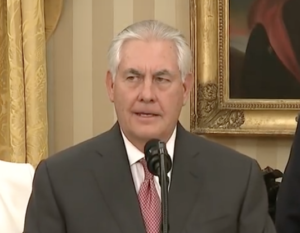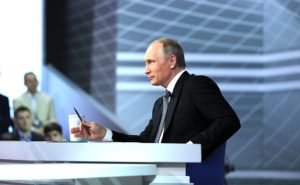Tillerson’s Bad Hand in Kremlin Showdown
President Trump’s hasty decision to attack Syria may have lightened political pressure at home but Russia’s retaliation – suspending a key “deconfliction agreement” – left Secretary of State Tillerson as supplicant at the Kremlin, reports Gilbert Doctorow.
The Russian media offered no complete account of what may have been accomplished during Secretary of State Rex Tillerson’s two-day visit to Russia, but there were hints of what the Russian negotiating position would have been behind closed doors and what may have justified Vladimir Putin making two hours available for Tillerson in what was otherwise a very busy day for the Russian President relating to domestic concerns.

Secretary of State Rex Tillerson at his swearing-in ceremony on Feb. 1, 2017. (Screen shot from Whitehouse.gov)
Before Tillerson’s arrival Russian media reported widely on his failure the day before at the G7 meeting to win support for imposing more sanctions on Russia for backing Syrian President Bashar al-Assad in light of the chemical weapons event in Idlib on April 4. That proposal was raised by U.K. Foreign Minister Boris Johnson and affirmed by Tillerson but rejected by all other G7 members. With that resounding defeat, Tillerson had no sticks from “the international community” to wield as an ultimatum against the Russians, telling them to get behind a U.S.-imposed “regime change” in Syria or suffer the consequences of further economic isolation from the West.
Tillerson also carried little in the way of carrots, given President Trump’s retreat on his campaign pledges to improve relations with Russia. Tillerson’s empty diplomatic bag was a topic discussed on Russian prime-time television the evening before his arrival. Senior Duma member and United Russia Party leader Vyacheslav Nikonov rhetorically demanded of Tillerson on the Evening with Vladimir Solovyov talk show: “So, make us an offer of what it means to go with America, what it brings us, and then we will consider it.”
In effect, Nikonov was calling the Trump administration’s bluff. He and the Russian elites understand perfectly that Donald Trump has no political capital to spend to get Congressional approval of normalized relations with Russia.
Just as the Tillerson-Putin meeting was taking place on Wednesday, another widely watched Russian talk show First Studio on the Pervy Kanal state channel opened with host Artyom Sheinin posing a baiting question to the American journalist Michael Bohm, a frequent visitor to the program who is often used as a punching bag. Referring to Tillerson’s initial meeting with Russian Foreign Minister Sergey Lavrov and the doubt that Putin would grant Tillerson a meeting, Sheinin said, “I believe there is the practice in big corporations for a new visitor who has come to see the boss to first undergo a ‘screening interview.’ It looks as if Tillerson passed this screening process and so he was allowed in to speak to the boss. Do you think this was a positive thing?”
In other words, the Russians knew that Tillerson came with empty hands and that he was the suitor, not the one being wooed. Tillerson came to discuss reinstatement of the Memorandum of Understanding on Deconfliction in Syria because on the U.S. side there was great concern over Russia’s refusal now to speak at the regional level to U.S. military counterparts and avert clashes on the ground and in the air that could lead to escalation of confrontation and possibly to all-out-war. The Russian withdrawal from the deconfliction arrangement following the U.S. missile strike on a Syrian airfield on April 6 put the continuation of U.S.-led military operations against Islamic State militants inside Syria in danger.
On April 8, senior Pentagon officials were denying that the Russians had severed all military-to-military hot lines, but there was a cold sweat in Washington. The uncertainty over whether Syrian and Russian air defenses might take aim at NATO aircraft had already led the Belgians to publicly announce cessation of all their flights within the U.S.-led anti-terror coalition. Presumably other NATO members had come to the same conclusion.
Meanwhile, my information backchannels indicate that the Russians set down their preconditions for reinstatement of the deconfliction arrangements: no further U.S. air attacks on Syrian government positions. We may be sure that this was the major subject for discussion and possible agreement during Tillerson’s talks with Putin.
The result may be something similar to the resolution of the Cuban Missile Crisis in 1962 when the U.S. claimed victory publicly as the Soviets pulled their missiles out of Cuba, but privately the U.S. had granted what Moscow had wanted, the removal of U.S. missiles from Turkey. But Putin is no Nikita Khrushchev, who lost prestige among his Kremlin peers for striking the agreement with the Americans; Putin is likely to gain stature from such an arrangement.
The U.S. Media’s Take
Meanwhile, the mainstream U.S. media presented the Putin-Tillerson meeting in relatively neutral terms given the American press corps general hostility to all things Russian. The Washington Post did better than other media outlets, with Moscow Bureau Chief David Filipov and his colleague covering the State Department in Washington highlighting the undeniable fact that the parties were “sharply at odds” and noting:

Russian President Vladimir Putin answering questions from Russian citizens at his annual Q&A event on April 14, 2016. (Russian government photo)
“Russia made it clear it was unwilling to roll back its strategic alliance with Syrian President Bashar al-Assad. The talks appeared unlikely to bring any significant breakthroughs after last week’s missile strike plunged U.S. relations to one of the lowest points since the Cold War. But despite the growing rifts, some general compromises were discussed.”
The areas of potential compromise were possible reinstatement of the information-sharing “deconfliction” Memorandum of Understanding with the United States that the Russians suspended immediately after the April 6 missile attack and creation of a U.S.-Russian working group to find ways to ease tensions between the two nuclear superpowers.
After that, the authors moved on to more trivial pursuits such as Donald Trump’s latest remarks about Assad being “an animal.” However, even amidst this swill there were a few points worthy of note because they gave expression to Russian policy positions at the talks: Russia’s refusal to accept ultimatums, such as Tillerson brought with him over choosing ties with the U.S. or Syria; Russia’s rejection of the allegations that Assad was behind the chemical attack in Idlib; Russia’s call for the Organization for the Prohibition of Chemical Weapons to investigate the use of chemical weapons there; and Putin’s likening the present situation to the one immediately preceding the U.S. invasion of Iraq. All of these important points are presented in the article at face value, alongside U.S., U.K. and other Western accusations directed against Russia
The New York Times coverage gave more attention to American action than to Russian reaction, as the opening of its cover headline for its several related articles indicates: “U.S. Pressures Russia …” The sub-article dealing with the Tillerson visit devotes more attention to what came before and after Putin’s meeting with Tillerson than to what they may have agreed on. The Times bureau chief David Sanger noted how Tillerson was held in suspense as his anticipated meeting with Putin was left in doubt until the last minute, what was described as a typical maneuver by the Russian president to keep his interlocutors off balance, a characterization which ignores the widely reported urgings of Russia’s talking heads before Tillerson’s arrival that their President not receive him because of the objectionable message on Syria that he had laid out on Monday at the meeting of G7 foreign ministers in Italy.
Indeed, the Times article said almost nothing about what may have justified the Putin meeting and what was agreed other than the working group to ease tensions, which Sanger correctly identifies as devoted to small and not the big divisive issues.
Gilbert Doctorow is a Brussels-based political analyst. His latest book Does Russia Have a Future? was published in August 2015




Geen opmerkingen:
Een reactie posten